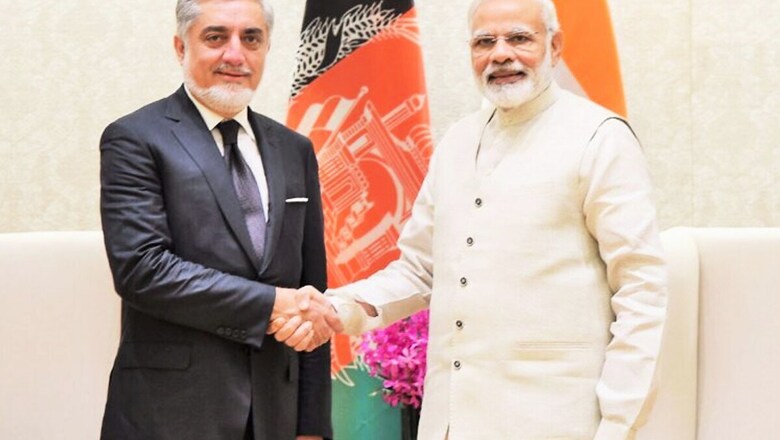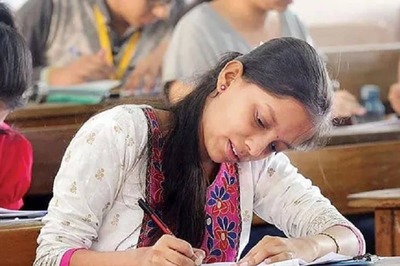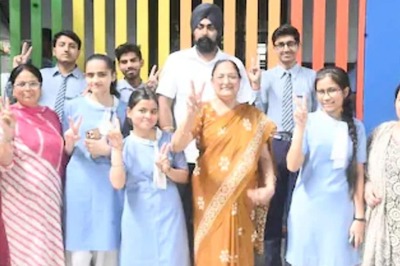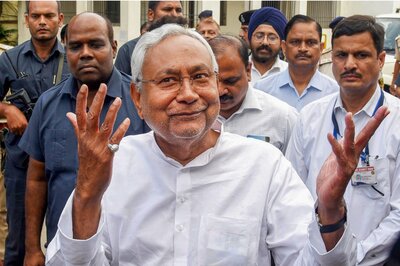
views
Violence has surged in Afghanistan in recent weeks despite the Afghan and Taliban sides engaging in peace talks since September, which have been suspended for close to a month now. And the new US government led by President Joe Biden has to decide whether to stand by the Trump administration’s commitment to pull all troops by May 1 under these circumstances. In an interview with CNN-News18, Afghan peace negotiator Abdullah Abdullah, who leads the High Council for National Reconciliation (HCNR), shared his perspective on the possible path towards a peaceful and prosperous Afghanistan amid changing geopolitical scenarios, and the role India has played so far and may play in the future.
The much-awaited US elections have happened and the results are out. Some reports say that the new Biden administration may review President Trump’s decision and some US forces may stay in Afghanistan. How do you look at this?
The review was necessary under any circumstances because there is an agreement between the US and the Taliban. Which part of the agreement is being implemented by the Taliban, or both sides, that needed review because according to that agreement there should have been reduction in violence. Unfortunately this has not happened. Participation in the negotiation in good faith…the negotiation has started which is a good news, but it’s moving very slowly. In that the 3rd point was on the relations with terrorist groups like al-Qaeda…getting ties with them by the Taliban…that is a question. So, that part of the review was necessary and so far they have not made a final decision, but it will not be like a revisit of the whole thing since the withdrawal was condition-based. So they will review if those conditions are met or not.
The Doha talks started on a positive note and the Afghan government accepted most of their demands. But attacks never stopped and are going on even today. Do you think the Taliban can’t control their own forces? Are they adamant or playing into the hands of some other country?
I think this is the test for the Taliban. There is an opportunity for talks. Unfortunately they are absent from the negotiation table these days, but still I am not disappointed. So the people of Afghanistan will judge it either way whether they are serious in achieving peaceful political settlement or not. Unfortunately the level of violence is unacceptable. The perception and the anticipation of the people of Afghanistan was that with the start of the talks if we do not have a comprehensive ceasefire, it will be something to that level so the right environment for the pursuit of the talks will help to get to an understanding. Unfortunately that condition is not there.
When we see this whole scenario and we find these Taliban groups playing into the hands of Pakistan and even Pakistan third-state actors have great connections with the Taliban…and the Kandahar hijack is not very old…what’s your take?
My role as the chairman of National Reconciliation has many aspects in what I am undertaking; one was regional diplomacy. We know what were and are the facts today and we have urged all countries including Pakistan to use all influence in persuading the Taliban or convincing the Taliban to first accept the ceasefire and second to participate in the negotiations in good faith and be flexible there. And I visited Pakistan…that was my first visit in the region after assuming the chairmanship of the council and there they said that ‘we believe that peace in Afghanistan means peace in Pakistan and peace in the whole region’. and I said I agree. I believe that’s the case. But in order for it to materialise, the Taliban should accept and should be convinced that there is no military solution. Hopefully, the Taliban are not making a miscalculation, I mean, thinking that the US troops may withdraw and then they may take advantage of that situation militarily, that will be like the continuation of the war forever. That does not mean peace in Afghanistan, peace in Pakistan, or peace in the region. And we are engaging all the neighbouring countries. My role is to get the positions closer together and that’s what I will pursue.
In the new scenario, if these talks continue and reach a logical conclusion, do you think India should also speak to the Taliban?
I think any country can speak to the Taliban. After all, instability in Afghanistan has affected the whole region. And if India, based on its own conclusions, wants to talk to the Taliban…because they are part of the reality of Afghanistan and the only thing that we have urged them to think about is that through war there will be no winners, through inclusive peaceful settlement there will be no losers and then all countries of the region have a stake in it. So I cannot advise the Indian government on what to do or what not to do, but if they decide to engage, I don’t see a problem there.
Earlier in an interview you said that withdrawal of troops is not completely wrong, one day Afghanistan needs to stand on its feet. And you also said it is not the end of US commitment. How do you see the role of the US in the days to come?
As a person who has fought against the occupation in my young age, this is the date of the withdrawal of Soviet troops from Afghanistan, exactly today, and how much Afghanistan suffered as a continuation of the war, before and after that, and I do believe as an Afghan citizen that we need to take responsibility of our own affairs in the field of security and defence.
At the same time, for this to materialise we need peace and a peaceful settlement here. And the reason that the international troops got engaged in Afghanistan…it was the presence of al-Qaeda and threats from al-Qaeda…which gave a lot of causalities as a result of that. In regards to the US decision on reduction of the forces…once the conditions are there I think that will be the desire of all the Afghans.
We want a peaceful, stable, unified, democratic Afghanistan, so the people with different ideas, like our ideas and the Taliban’s are very different from one another. But we need to decide to fight for our ideas politically rather than resorting to violence or relying on terrorist groups. So that’s what the end stage should look like in Afghanistan. And all my focus is to help get it towards that aim. I see the challenges, I see the hopes of the people of Afghanistan, I see their sufferings, and I am completely convinced that there is no military solution through the continuation of the war. We need to find a political settlement, a political solution, which is acceptable to the people of Afghanistan.
I’m coming back to the role of Pakistan. Do you think Pakistan is provoking, training and equipping certain factions of the Taliban and creating trouble?
Look, I have talked about it in my previous roles…about the situation, about the Taliban, where they get support, where they don’t. All I am saying at this moment is that it’s in no country’s interest that the war should continue in Afghanistan. In the continuation of the war, there might be ideas about it, but no country can achieve its legitimate interest, and while in peaceful Afghanistan, stable Afghanistan, the whole region can flourish, including Pakistan. My role is different as I mentioned earlier, it’s bringing views together, so while I can see what is going on inside Afghanistan, inside Afghanistan, or in the region, but at the same time, I asked all countries to do whatever they can to help facilitate the political settlement acceptable to the people of Afghanistan, Afghan-owned and Afghan-led political settlement…that’s their interest and Afghanistan wants to be at peace within and without, and also we can develop together in the whole region, south and central Asia.
PM Modi is playing a major role in regional stability. You think he is playing a promising role as expected?
We are thankful, we are grateful to the Indian government, and for PM Modi’s support for Afghanistan. Only a few days ago, infrastructure for a water-electricity dam was inaugurated, with the support of India. You mentioned the vaccine. As far as Afghanistan is concerned India’s stated goal is a stable Afghanistan, democratic Afghanistan, a country that does not harbour any terrorist group or does not pose any threat to any of the countries in the region, which is something that the people of Afghanistan appreciate.
Now after the arrest of some MMS (ministry of state security, China) spies operating from Afghan soil, raising eyebrows and indicating that China is also meddling in Afghan affairs…how do you react to that?
My point is that only countries, through legitimate relations with Afghanistan, with the people of Afghanistan and in the context of their legitimate interest, every country has its own role, every country has its own interest. And all countries’ interests rely on stability in Afghanistan. Yes, there are terrorist groups that are active in Afghanistan in the past…in east Turkistan. Still they are working together with the Taliban and they are aiming towards China. That’s unfortunately a sad product of the continuation of the war here. They are fighting with us first and foremost and then they are posing a threat against China. They have their own concerns about that situation here, but altogether, hopefully out of 42 years of war continuation in Afghanistan…and countries around Afghanistan should have reached a conclusion that this is the time to focus all the efforts in support of peace and a peaceful settlement.
What is the timeline that you see for the Afghan-Taliban peace dialogue?
When it comes to peaceful settlement, of course, the sooner the better. If we can do it today, we shouldn’t wait until tomorrow. We do understand that it takes time. Meanwhile, we shouldn’t waste any time, like in the past few weeks, unfortunately, the time available was not utilised in the best way by the Taliban. So rather than putting a sort of timeline or a deadline, we should see the urgency of the situation…we should see the demand of the people of Afghanistan and then act accordingly.
Do you see them coming to the dialogue table soon? Will you urge them to, that, like you said, everybody has to work in the interest of the nation?
Absolutely. Unfortunately, earlier there was no opportunity for talks and when the talks started in Doha a few months ago, that’s the opportunity, and that’s the opportunity for the Taliban as well, for the people of Afghanistan first and foremost. And also that’s a test, which will put into test our resolve: do we really want to achieve peace, are we really serious and genuinely trying to achieve it, and should this be the case. And then, of course, the rest of it is the ability to continue to work together to debate, to discuss, to argue, to compromise. But at the same time make sure that you are getting closer to political settlement rather than getting far.
The honesty towards this cause, the commitment, has to come from both sides. Is that happening?
I am not writing things off at the moment because the Taliban has not announced that they will not negotiate. Yes, of course, if it is only one side, there is only so much that could be done. It takes both sides to be on the same page, as far as the goal is concerned, and the Taliban head of negotiations said at the inauguration of the Doha conference…that there is no military solution, we want a peaceful settlement, and wanting a peaceful settlement cannot be done only by stating it. First of all, it shows the intention and then resolve, and determination to pursue it. It will not be without problems for those who are pursuing this cause. It’s not an easy path, but this is the path of the continuation of the war…that’s the most difficult one and that’s not a choice. But both, hopefully, will return back. Otherwise it means that one side might have decided that they will continue the war, which is not a solution. If there is one lesson in the past 42 years it is that there is no military solution and hopefully they will get to that position.
What’s your message to the world community?
The world at large, and the international community as a whole, countries of the region, Islamic countries, all of them, they have played a role, they have helped the people of Afghanistan in the past 20 years especially. And also, not only in building Afghanistan, but a lot has been achieved as a result of that support and sacrifices also being made by our partners as well. And today is the time to make all the efforts possible in support of the peace share because the previous situation in Afghanistan, prior to September 11…it was the immediate threat towards the people of Afghanistan, but then we had anticipated. Late Ahmad Shah Massoud, the national hero of Afghanistan, had given a message while answering a question that was in 2001, a few months before his assassination or before September 11…that was the message to President Bush…Bush was just elected at that time, and his message was that ‘help the people of Afghanistan to achieve peace, otherwise this will hurt you as well’.
PM Modi has told India, in the post-Covid atmosphere it’s now or never for us as a nation, the dream for us to be an Atmanirbhar Bharat. Let me ask you, for somebody who has gone through so many twists and turns with Afghanistan, and various roles you have, what’s your dream for Afghanistan? Where do you see Afghanistan in 10-15 years from now?
Afghanistan also has a potential to be self-reliant. Afghanistan, which will be peaceful, its people enjoying its rights, and the plurality of Afghanistan represented in the future, a system which helps them. Afghanistan can flourish economically. The country is rich. Our geographical location provides the best connectivity between south Asia and central Asia. And not only Afghanistan but countries around can benefit from it. Of the 40 years of war, there is nothing more than just a durable peace that I could wish for the people of Afghanistan.
Read all the Latest News, Breaking News and Coronavirus News here




















Comments
0 comment